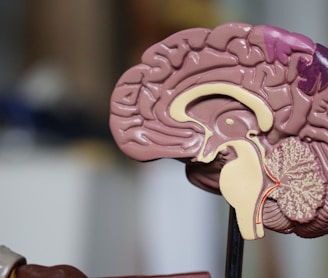Mental Health
HEALTHFEATURED
Shubham Kumar
3/27/20233 min read


Mental health is an essential component of overall health and well-being. It refers to a person's emotional, psychological, and social well-being. Good mental health enables an individual to cope with the daily stresses of life, maintain healthy relationships, and make sound decisions. On the other hand, poor mental health can lead to a range of mental health disorders, including anxiety, depression, and substance abuse.
The Importance of Mental Health
Mental health is important for several reasons.
Firstly, it affects our daily life, from the way we think, feel, and behave to the decisions we make. Poor mental health can negatively impact our ability to perform daily tasks, work, and maintain relationships.
Secondly, mental health is linked to physical health, and poor mental health can lead to physical health problems. Lastly, good mental health is essential for personal growth and development.
Facts
Globally, one in seven 10-19-year-olds experiences a mental disorder, accounting for 13% of the global burden of disease in this age group.
Depression, anxiety and behavioural disorders are among the leading causes of illness and disability among adolescents.
Suicide is the fourth leading cause of death among 15-29 year-olds.
The consequences of failing to address adolescent mental health conditions extend to adulthood, impairing both physical and mental health and limiting opportunities to lead fulfilling lives as adults.
Mental Health Disorders
There are several types of mental health disorders, including:
Anxiety disorders: This type of disorder is characterized by excessive worrying, fear, and apprehension.
Mood disorders: This type of disorder is characterized by extreme highs (mania) or lows (depression).
Personality disorders: This type of disorder is characterized by maladaptive patterns of behavior, thinking, and feeling.
Schizophrenia: This type of disorder is characterized by delusions, hallucinations, and disordered thinking.
Substance abuse disorders: This type of disorder is characterized by the excessive use of drugs or alcohol.
Emotional disorders: It is estimated that 3.6% of 10-14 year-olds and 4.6% of 15-19 year-olds experience an anxiety disorder. Depression is estimated to occur among 1.1% of adolescents aged 10-14 years, and 2.8% of 15-19-year-olds.
Suicide and self harm: The leading cause of death in older adolescents (15-19 years)(2). Risk factors for suicide are multifaceted, and include harmful use of alcohol, abuse in childhood, stigma against help-seeking, barriers to accessing care and access to means of suicide.
Treatment for Mental Health Disorders
Treatment for mental health disorders depends on the type and severity of the disorder. However, some common treatments include:
Psychotherapy: This treatment involves talking to a mental health professional to identify and address the underlying causes of the disorder.
Medication: Medication can be prescribed to treat the symptoms of mental health disorders.
Support groups: Support groups can provide emotional support and a sense of community for individuals with mental health disorders.
Lifestyle changes: Making lifestyle changes such as exercising regularly, getting enough sleep, and eating a healthy diet can help improve mental health.
Preventing Mental Health Disorders
While some mental health disorders cannot be prevented, there are several things that individuals can do to promote good mental health, including:
Maintaining healthy relationships with family and friends
Practicing self-care activities such as yoga, meditation, or journaling
Getting enough sleep and exercise
Avoiding drugs and excessive alcohol consumption
Seeking professional help if experiencing symptoms of a mental health disorder
Response from WHO (World Health Organization)
WHO works on strategies, programmes and tools to assist governments in responding to the health needs of adolescents.
For example, the Helping Adolescents Thrive (HAT) Initiative is a joint WHO-UNICEF effort to strengthen policies and programmes for the mental health of adolescents. More specifically, the efforts made through the Initiative are to promote mental health and prevent mental health conditions. They are also intended to help prevent self-harm and other risk behaviours, such as harmful use of alcohol and drugs, that have a negative impact on the mental ̶ and physical ̶ health of young people.
WHO is developing and testing scalable psychological interventions to address emotional disorders of adolescents, and guidance on mental health services for adolescents.
In conclusion, mental health is an essential component of overall health and well-being. Good mental health enables individuals to lead happy and fulfilling lives, while poor mental health can lead to a range of mental health disorders. Understanding mental health and seeking help when necessary is crucial for maintaining good mental health.
Like this article? Share the word!
Related Post
Shubham Vision Ltd © 2023
Shubham Vision empowers the generation of tomorrow for a brighter future and hope for every individual.
Would you like to here more
Subscribe to our newsletter and never miss a story.
We care about your data in our privacy policy.
